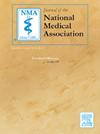Reporting Patterns: Racialized Inequities in Military Health Research
IF 2.3
4区 医学
Q1 MEDICINE, GENERAL & INTERNAL
引用次数: 0
Abstract
Background
Numerous guidelines provide recommendations for reporting racialized inequities in health and healthcare research. However, dissemination and utilization of such guidelines may be stymied. This scoping review aims to understand how radicalized inequities among U.S. active duty service members are described in research and to what extent these descriptions align with recommended reporting practices.
Methods
This systematic scoping review was conducted using PubMed, CINAHL, PsycINFO, and Embase databases. Studies published between January 2022 and February 2023 that focused solely on U.S. active duty service members and health outcomes were included. Studies were excluded if racialized inequities were not described in both the Results and Discussion sections. Articles underwent abstract screening, full-text review, and data extraction by multiple co-authors. Data were analyzed using descriptive statistics.
Results
Of the 1,083 screened studies, 21 met the inclusion criteria. Most studies (81%) included multiple military services and relied on administrative record extraction, where race and ethnicity were self-reported (86%). However, none of the studies explicitly provided a structurally responsive rationale for including race and ethnicity in analyses. Instead, racialized inequities were often attributed to race as a risk factor (57%) rather than to structural determinants. Additionally, 86% of studies aggregated service members into broad racial categories such as “other” or “other and unknown.” Language inconsistencies were common, with 52% using “race/ethnicity” or “Asian/Pacific Islander,” 29% using “non-White,” and 29% referring to race or ethnicity as nouns (e.g., “Blacks”). Only 14% explicitly referenced structural determinants of radicalized inequities.
Discussion
The findings indicate a limited use of structurally responsive language describing racialized inequities in the included publications focused on U.S. active duty service members. Race and ethnicity were frequently conceptualized as risk factors, and in one instance, as a biological construct, rather than as proxies for structural and institutional inequities. These results align with prior research indicating that racial and ethnic identities are often underreported or underrepresented in clinical trials and healthcare studies. To improve dissemination of reporting recommendations, journals and research institutions should implement structured guidelines and training programs emphasizing the use of health equity frameworks. Additionally, researchers could be encouraged to incorporate discussions of structural and institutional factors contributing to inequities, rather than solely presenting race as an explanatory variable.
Conclusion
This scoping review highlights critical gaps in the reporting of racialized inequities in health research involving U.S. active duty service members. Addressing these gaps through improved research practices, targeted education, and enforcement of reporting guidelines may enhance the structural competency of future studies. These efforts could contribute to more effective strategies for mitigating racialized inequities within the Military Health System.
报告模式:军队健康研究中的种族不平等
背景:许多指南为报告健康和保健研究中的种族不平等现象提供了建议。但是,这种准则的传播和利用可能会受到阻碍。本综述旨在了解研究中如何描述美国现役军人中激进的不平等现象,以及这些描述在多大程度上与建议的报告实践相一致。方法采用PubMed、CINAHL、PsycINFO和Embase数据库进行系统的文献综述。在2022年1月至2023年2月期间发表的研究只关注美国现役军人和健康结果。如果结果和讨论部分均未描述种族不平等,则排除研究。文章经过摘要筛选、全文审查和多名共同作者的数据提取。数据分析采用描述性统计。结果在1083项筛选研究中,21项符合纳入标准。大多数研究(81%)包括多种军事服务,并依赖于行政记录提取,其中种族和民族是自我报告的(86%)。然而,没有一项研究明确提供了在分析中包含种族和民族的结构响应性理论基础。相反,种族化的不平等往往归因于种族作为一个风险因素(57%),而不是结构性决定因素。此外,86%的研究将服役人员划分为“其他”或“其他和未知”等广泛的种族类别。语言不一致很常见,52%的人使用“种族/民族”或“亚洲/太平洋岛民”,29%的人使用“非白人”,29%的人将种族或民族作为名词(例如“黑人”)。只有14%的人明确提到了激进不平等的结构性决定因素。研究结果表明,在针对美国现役军人的出版物中,描述种族化不平等的结构反应性语言的使用有限。种族和民族经常被概念化为风险因素,在一个例子中,作为一种生物结构,而不是作为结构和体制不平等的代表。这些结果与先前的研究一致,表明在临床试验和医疗保健研究中,种族和民族身份往往被低估或代表性不足。为改进报告建议的传播,期刊和研究机构应实施强调使用卫生公平框架的结构化指南和培训方案。此外,可以鼓励研究人员将导致不平等的结构性和制度性因素纳入讨论,而不是仅仅将种族作为一个解释变量。结论:这一范围审查突出了在涉及美国现役军人的健康研究中种族不平等报告中的关键差距。通过改进研究实践、有针对性的教育和报告指南的执行来解决这些差距,可能会提高未来研究的结构性能力。这些努力有助于制定更有效的战略,以减轻军队卫生系统内的种族不平等现象。
本文章由计算机程序翻译,如有差异,请以英文原文为准。
求助全文
约1分钟内获得全文
求助全文
来源期刊
CiteScore
4.80
自引率
3.00%
发文量
139
审稿时长
98 days
期刊介绍:
Journal of the National Medical Association, the official journal of the National Medical Association, is a peer-reviewed publication whose purpose is to address medical care disparities of persons of African descent.
The Journal of the National Medical Association is focused on specialized clinical research activities related to the health problems of African Americans and other minority groups. Special emphasis is placed on the application of medical science to improve the healthcare of underserved populations both in the United States and abroad. The Journal has the following objectives: (1) to expand the base of original peer-reviewed literature and the quality of that research on the topic of minority health; (2) to provide greater dissemination of this research; (3) to offer appropriate and timely recognition of the significant contributions of physicians who serve these populations; and (4) to promote engagement by member and non-member physicians in the overall goals and objectives of the National Medical Association.

 求助内容:
求助内容: 应助结果提醒方式:
应助结果提醒方式:


